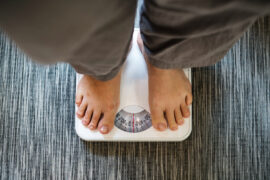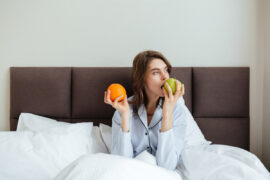It’s extremely difficult in this day and age to maintain a healthy sleep schedule and bedtime routine. Odds are that you’re one of millions of people caught up in the struggle. But instead of banging your head against the wall, you can make a few subtle changes to improve your sleep for the better. Below, you’ll find a troubleshooting guide with tips and suggestions you can apply to your everyday – or every night, rather – life in order to get the best possible sleep at night.
Common Mistake #1: Bright Lights at Night
The technological advances man has made in recent decades are beyond astounding. But some of the consequences of these technological advances weren’t thought through before they became widespread. The artificial light we expose ourselves to every day – and increasingly, at night – it’s not something our bodies can handle.
You see, the human body is designed to release melatonin (which makes you feel sleepy) as soon as the sun goes down and light exposure becomes minimal. But these days, even after the sun has gone to bed, our eyes are still being bombarded with bright lights. This tricks your brain into thinking it’s still daytime, which prevents the natural release of melatonin in the evenings. The more time you spend in front of your computer, your television, or on your phone post-sunset, the more likely you are to be kept awake at night.
How to Troubleshoot Your Light Exposure
Obviously, the most straightforward solution is to minimize your exposure to artificial light after the sun goes down. And no, we’re not insisting that you flip all the breakers in your fuse box and force yourself to stumble around in the dark between sunset and bedtime. But there are few things you can do to reduce your light exposure and help your brain release more melatonin in the evening:
- Install dimmer switches in the rooms you spend the most time in during the evening
- Spanish 20 to 30 minutes reading a book before bed instead of watching TV
- Install a filter on your phone or computer that reduces blue light output
- Install blackout curtains in your bedroom and/or purchase a sleep mask
Employing any or all of these troubleshooting tips will help you feel more relaxed before bed.
Common Mistake #2: Your Diet and Exercise Goals Are Working Against You
Most people don’t realize that their daily diet and exercise regimen – or lack thereof – may be counterintuitive when it comes to their nightly sleep patterns. Most people may already be aware that they should avoid certain foods and beverages if they want to get a healthy night’s sleep. What most people don’t know, however, is that even if you eat the right foods, consuming them at the wrong time can also hinder your sleep. Likewise, if your exercise schedule does not jive well with your sleep schedule, you could be left tossing and turning all night.
How to Troubleshoot Your Diet and Exercise for Better Sleep
If you want to optimize your diet and exercise regimen for the best possible sleep at night, try employing a few of these tactics:
- Eat your biggest meal of the day in the morning, and gradually reduce your food intake as the day goes on
- Try to reduce the amount of fatty, sugary food you eat, as well as processed carbs
- If you must eat in the evening, stick to vegetables, whole grains, and protein
- Establish a regular exercise routine. If your lifestyle is completely sedentary, start with a Brisk 20-minute walk 3 nights a week right after dinner. Not only will it help boost digestion and metabolism, but it’ll get your body in the perfect state for rest
- Read before bed. But make sure it’s something relaxing, so that you don’t get your brain too worked up
Common Mistake #3: Your Sleep Aid Is Working Against You
Most people are generally not aware of the negative consequences of most sleep aids. Others try to ignore the negative side effects of these drugs because, in their minds, being able to fall asleep at night is worth more to them than the consequences. But the fact of the matter is that, no matter how much you think sleep drugs are helping you, odds are that they are legitimately doing more harm than good.
Let’s start by talking about prescription drugs. There are all sorts of scary side effects from prescription sleep medications – from sleep eating to sleep driving to next day grogginess and even a purportedly higher cancer risk – that many people don’t know about, or don’t care. But in reality, the side effects can be extremely dangerous and have a profoundly negative impact on your quality of life (not to mention your longevity).
Then there are over-the-counter sleep aids. They are cheap and easy to get, and for most people, the recommended dosage alone is more than enough to knock them out for the night. But that doesn’t mean they are safe, or that they are improving your sleep quality. If anything, they still run the risk of giving you a “sleeping pill hangover”, which can make it dangerous for you to operate heavy machinery the next day. There are also some studies which suggest that taking sleeping pills over a long period of time can lead to the development of degenerative brain disorders like dementia.
How to Pick the Right Sleep Aid
So if prescription drugs and over-the-counter sleep aids are dangerous and counter effective, then what other options are there? Natural sleep aids, of course. Thankfully, they are as abundant as they are affordable. But not all of them are created equal. You obviously want to target the sleep aids that have a variety of natural ingredients which are proven to induce sleep, like hops, chamomile, valerian root, and melatonin (just to name a few). You also want to make sure that they come from a seller who stands behind their product with a money-back guarantee. Of course, since we are sleep experts, we have some herbal sleep aid suggestions for you to start with. You wish you the best of luck on improving your sleep hygiene, and sweet dreams!




